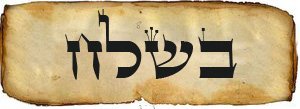|
Beshalach means "sent away." The Torah states that Pharaoh sent away the Jewish people from Egypt.
Why didn't they want to go of their own accord?
Because there were those amongst the Jewish people that did not want to leave Egypt, and it is only because Pharaoh sent them away that they left. 
But how could a Parsha filled with wonders and miracles be given such a negative name? In this Parsha we read how the sea split, manna came down from Heaven, and water came out of a rock. And yet all of these privileges are collectively known as "Beshalach," a word that expresses negative elements within the Jewish people, that they did not wish to leave Egypt?!
However, the point here is that Pharaoh's transformation - from an evil tyrant to one who actually assisted the Jews to leave - was a change which occurred as a result of the Jewish people. Since many Jews did believe in Moshe and followed God's command, they not only overcame opposition from the non Jewish world, but their good deeds actually caused their enemy to be transformed into an assistant.
So, in the final analysis, "Beshalach" expresses not the weakness, but the great influence of the Jewish people on the outside world - how th rough the observance of Torah and mitzvos, an enemy can be transformed into a friend.
From this we can learn a powerful lesson in daily life: Often, the secular world appears. to present insurmountable obstacles to the observance of Jewish law and custom. However, God only created these obstacles in the first place so that we should rise to the challenge and overcome them. In this way we lift ourselves up to be stronger and more committed Jews.
Once a hurdle has been successfully overcome, one often finds that the very same person or thing that was the cause of the opposition makes a 180 degree turn and actually starts to help you follow the ways of Torah and mitzvos - like Pharaoh, who first opposed the Jewish people's observance of God, and later assisted them.
(Based on Sichas Shabbos Parshas Beshalach 5725 & 5734)
|

